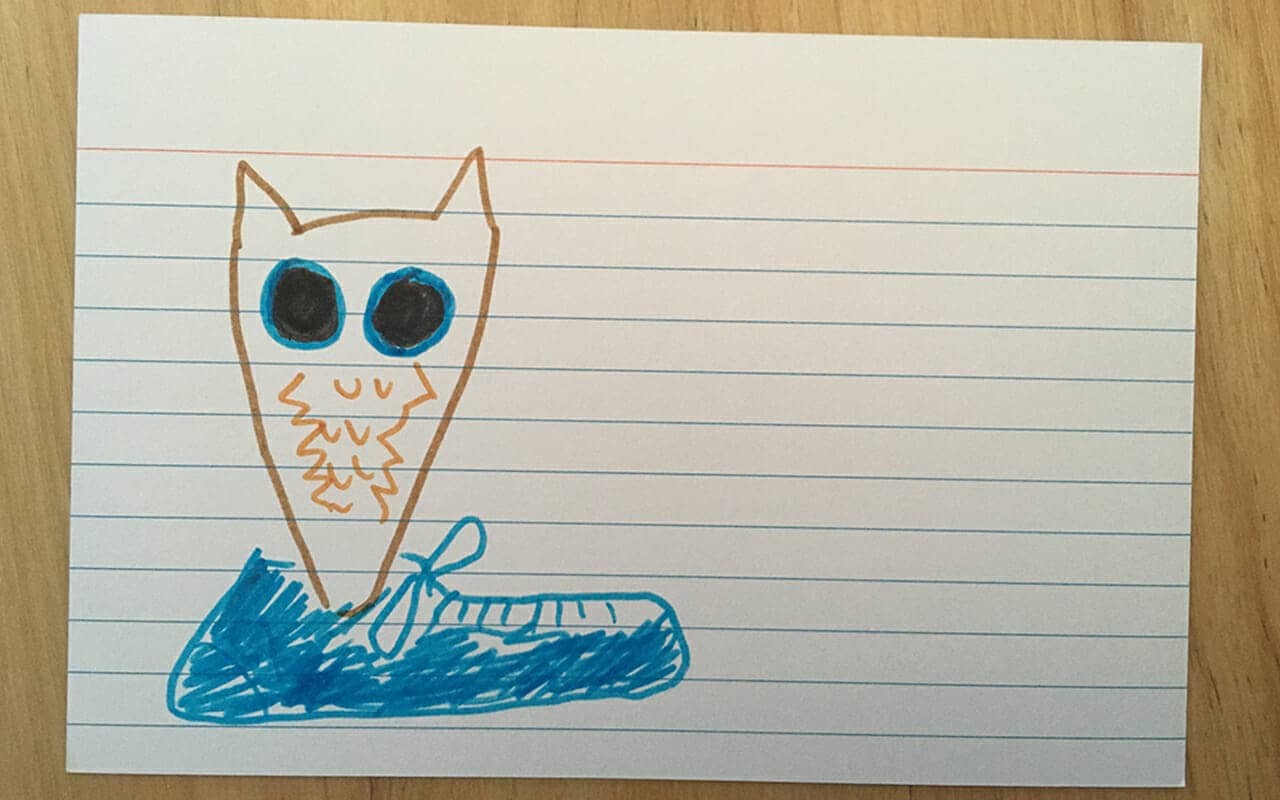 Mastering the most common phrases in French is a key starting point when learning this beautiful language.
Mastering the most common phrases in French is a key starting point when learning this beautiful language.
But what are the most important phrases?
And how can you easily usher them into your long-term memory?
More importantly, how do you improve your pronunciation as quickly as possible?
And how do you avoid feeling embarrassed when you make a mistake?
Today, you’ll discover the most important French phrases to know and receive strategies for learning them permanently.
Fast.
Ready?
Let’s dive in!
10 Common Phrases in French You Need to Learn First
As we go through this list, keep in mind that we’ll get into the memory techniques further down this page.
That’s where I’ll share some specific examples as well, all based on the ancient mnemonic strategies I’ve been teaching language learners for over a decade.
Phrase #1: Salut!
The simplest phrase of all is “Hi!”
It’s a little less formal than “Bonjour” for “Good day” (more or less).
You can also use salut to attract attention.
For a fun example of how it is used in music, check out Joe Dassin’s song, Salut.
The great thing about this song is that the lyrics give you a bunch of other easy French sentences to learn. Memorizing song lyrics is a fantastic language learning strategy overall.
Phrase #2: Quoi De Neuf?
“What’s new?” is probably one of the most common phrases in every language. When you meet up with someone, we can instantly form a connection by asking what’s going on for them recently.
Quoi De Neuf? is a great way to ask this important question. And at just three words, it’s easy to memorize.
Phrase #3: Je Ne Sais Pas
When you don’t know, you don’t know and there’s no shame in that.
“Je ne sais pas” is a great way to express this key point.
If you’re listening to music like I’ve suggested, the Joe Dassin single for Salut has another song on it with “pas” in the title. Observation is a great way to build your pattern recognition skills as a language learner, so look at for repeated words in different contexts.
Phrase #4: Je Ne Sais Quoi
This French phrase is different than “Je ne sais pas,” which is literally “I don’t know.”
Using “Je ne sais quoi” is like saying, “I can’t find the words to explain it.” It’s a bit more advanced, but still a very useful phrase to have at the tip of your tongue.
Phrase #5: Je Suis Désolé
This phrase means, “I am sorry.”
One quick way to start learning what the diacritical marks are telling you about how to pronounce this phrase is to search the individual words and listen to them.
Forvo is one of my favorite sites because it usually gives you multiple translations from different genders and different areas of the country.
Phrase #6: Merci
When someone does something nice for you, it’s only polite to say thank you.
For that, a simple “merci” will do.
To upgrade your gratitude to “thanks a lot,” say “merci beaucoup.”
Phrase #7: Je voudrais
An easy way to say, “I would like” something is Je voudrais.
For example, if you enter a restaurant and want a table, you can say, “Je voudrais une table.”
Phrase #8: C’est Combien?
It’s important to never buy anything until you know the price.
That’s why “how much is it” is important to know in French.
Commit “c’est combien?” to memory and you’ll avoid making costly mistakes. You just need to also know the numbers that will be said back to you, and for that having memory techniques for numbers will be very helpful.
Phrase #9: Comment T’appelles-Tu?
What’s your name?
If you’re in an informal situation, you can ask, “comment t’appelles-tu?”
In a formal situation, ask “comment vous appelez-vous?”
How do you know the difference between formal and information situations?
Typically, if the person is older than you and you’re strangers, use “comment vous appelez-vous?”
If you’re addressing a kid or someone entering an informal situation, “comment t’appelles-tu?” is fine.
Phrase #10: Pourquoi?
Want to know why the spelling of this word is so challenging? Well, part of the reason is that it’s French, that’s why.
And “why?” is exactly what pourquoi means.
If you’re looking for an easy way to memorize spellings, check out the pegword method. It takes a bit of setup, but after that, memorizing any spelling is easy.
XX Memory Tips to Help You Memorize French Phrases
We can go on listing popular French phrases for a long time, but I want to help you remember them.
That way, you can go through any list of words and phrases and rapidly commit them to long-term memory.
One: Use “Magnetic” Associations
I personally know many language learners, including some of the world’s most famous polyglots. The one thing all of them have in common is the use of mnemonic imagery.
How does it work?
Let’s take “pourquoi,” for example.
Rather than repeat this word over and over using rote learning, I would rather imagine Prince pouring quills over Quincy joins as he tries to shout “why”? But it comes out sounding more like “what” or “wha” because he’s trying to ask “why” and “what” at the same time.
This image using the linking and story method to create sound and meaning links at the same time.
Although this technique sometimes has weaknesses, with practice, you can become faster and more precise.
For more examples from polyglots on how they use associations, check out these language learning books.
Two: Add the Memory Palace Technique
As you practice making associations with French phrases, you’ll want a place to store them. That way, you can revisit them in your mind later.
Revisiting your images and decoding them is a key part of language learning. You can even optimize how you revisit information by learning about spaced repetition.
So what is the Memory Palace technique?
It’s an additional layer of association. If we take our pourquoi example (why), we can put Prince “pouring” out his quills in the corner of a bedroom or similar location.
Here’s an example Memory Palace. Just look at the first station and try to image the suggested scene taking place on the bed. I’ve done exactly that to memorize thousands of words and phrases in many languages.
Three: Use Flashcards Optimally
A lot of people prefer paper flashcards or software like Anki to the Memory Palace technique.
But get this:
You can actually make each technique stronger by using them in combination. To do that, please explore these techniques deeply, especially the most advanced approaches, which have interesting names like:
Here’s a simple flashcard example for one of the “coolest” French phrases I know:
This owl in a shoe helped me memorize “C’est chouette!”
It’s means, “That’s cool!”
Four: Trick Yourself
Now, let me explain a little bit more about the mnemonic flashcard example for “C’est chouette!”
Based on suggestions from memory expert Tony Buzan, I made sure to use three colors. And one of these colors is cool blue, which helps me remember the English meaning of this French term: “It’s cool.”
“Chouette” itself means “owl.” In full French grammar, it would be “La chouette” because it’s a feminine noun. To help remember that fact, I imagine that this owl is a “cool” Los Angeles movie star.
But the ultimate technique here is that there is no answer on the back of the card. I have forced myself to solve the riddle.
Pourquoi? Why?
Because the science of active recall makes it clear that when you don’t feed yourself the answer and make your memory work a little, you form memories faster.
Now that’s what I call cool indeed.
Five: Use the Big Five
One reason people struggle to remember French phrases is because they don’t use all of their minds.
Using the Big Five solves this problem. It involves weaving together these core learning practices:
- Reading
- Writing
- Speaking
- Listening
- Memorizing
By switching between these activities with the French phrases you want to learn, you’re tapping into a memory-boosting activity scientists call interleaving.
Please don’t miss out on the opportunity bringing all of these activities together provides you for learning faster and retaining more.
It’s especially important to use interleaving if you ever want to learn French and Spanish at the same time.
French Phrases To Know And Memorize For Life
If you’ve been wondering how hard is French to learn, I think now you have a much clearer idea. Learn to master words and phrases, and it won’t be hard at all.
And that’s very good news, because French is one of the absolute best languages to learn on the planet.
Ultimately, a lot of people get stuck because they have critical thinking barriers they need to blast through.
Logically speaking, the most important part of learning French is making sure your memory is up to the task.
So if you’ve found the tips and mnemonic examples for French phrases I’ve shared today helpful, please get my FREE Memory Improvement Kit:
It will help ensure that you can memorize all the French phrases and become an overall vocabulary memorization master quickly.
Memory is so important because French, like all living languages, keeps expanding.
And there are countless years of historical French plays, novels, poems and more to enjoy.
You will never run out of French phrases to learn, so make sure you have memory techniques on your said.
So let me leave you with one more French phrase you actually won’t need if you take action and learn the Memory Palace for language learning today.
Bonne chance! Good luck!
Why (pourquoi) won’t you need luck?
Because this technique helps you make your own.
That way, you won’t have to wait around for it.
C’est chouette, or what?
Related Posts
- MMMP 009: Memory Training Consumer Awareness Guide
Here's an audio presentation of The Magnetic Memory Method "Memory Training Consumer Awareness Guide."
- The Ultimate Guide to the Link Method For Memorizing Details
Are you confused by the link method? This post will cover everything you need to…
- Stoic Secrets For Using Memory Techniques With Language Learning
Christopher Huff shares his Stoic secrets for using memory techniques when learning a language. You'll…









